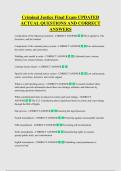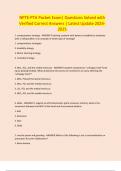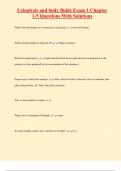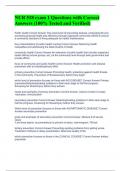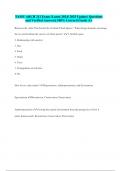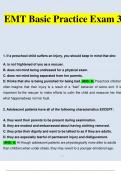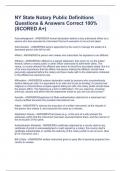Research Methods
Chapter 7: Sampling: Estimating the Frequency of Behaviors and
Beliefs
Generalizability: Does the sample represent the population?
External validity is often extremely important for frequency claims. Recall that
external validity concerns both samples and settings.
Populations and Samples
A population is the entire set of people or products in which you are interested.
The sample is a smaller set, taken from that population.
Researchers usually don’t need to conduct a census (every member of the
population), they study a sample of people, assuming that if the sample behaves
a certain way, the population will do the same. The external validity of a study
concerns whether the sample used in the study is adequate to represent the
unstudied population.
Before researchers can decide whether a sample is biased or unbiased, they have
to specify a population to which they want to generalize: the population of
interest.
Coming from a population vs. Generalizing to that population
For a sample to be representative of a population, the sample must come from
the population. However, coming from the population is not sufcient by itself;
that is, just because a sample comes from a population does not mean it
generalizes to that population.
Samples are either biased or representative. In a biased sample, also called an
unrepresentative sample, some members of the population of interest have much
higher probability of being included in the sample compared to other members.
In an unbiased sample, also called a representative sample, all members of the
population have an equal chance of being included in the sample.
Ways to get a biased sample
A sample could be biased in at least two ways: Researchers might study only
those they can contact conveniently, or only those who volunteer to respond.
Diferent opinions from those who are less handy and less willing.
Sampling Only Those Who Are Easy to Contact
Many studies incorporate convenience sampling, using a sample of
people who are easy to contact and readily available to participate.
Another form of convenience sampling is used in online studies.
Researchers might also end up with a convenience sample if they are
unable to contact an important subset of people. Such circumstances may
result in a biased sample when the people the researchers can contact are
diferent from the population to which they want to generalize.
Sampling Only Those Who Volunteer
Another way a sample might be biased is through self-selection, a term
used when a sample is known to contain only people who volunteer to
participate. Self-selection is ubiquitous in online polls, and it can cause
1
Chapter 7: Sampling: Estimating the Frequency of Behaviors and
Beliefs
Generalizability: Does the sample represent the population?
External validity is often extremely important for frequency claims. Recall that
external validity concerns both samples and settings.
Populations and Samples
A population is the entire set of people or products in which you are interested.
The sample is a smaller set, taken from that population.
Researchers usually don’t need to conduct a census (every member of the
population), they study a sample of people, assuming that if the sample behaves
a certain way, the population will do the same. The external validity of a study
concerns whether the sample used in the study is adequate to represent the
unstudied population.
Before researchers can decide whether a sample is biased or unbiased, they have
to specify a population to which they want to generalize: the population of
interest.
Coming from a population vs. Generalizing to that population
For a sample to be representative of a population, the sample must come from
the population. However, coming from the population is not sufcient by itself;
that is, just because a sample comes from a population does not mean it
generalizes to that population.
Samples are either biased or representative. In a biased sample, also called an
unrepresentative sample, some members of the population of interest have much
higher probability of being included in the sample compared to other members.
In an unbiased sample, also called a representative sample, all members of the
population have an equal chance of being included in the sample.
Ways to get a biased sample
A sample could be biased in at least two ways: Researchers might study only
those they can contact conveniently, or only those who volunteer to respond.
Diferent opinions from those who are less handy and less willing.
Sampling Only Those Who Are Easy to Contact
Many studies incorporate convenience sampling, using a sample of
people who are easy to contact and readily available to participate.
Another form of convenience sampling is used in online studies.
Researchers might also end up with a convenience sample if they are
unable to contact an important subset of people. Such circumstances may
result in a biased sample when the people the researchers can contact are
diferent from the population to which they want to generalize.
Sampling Only Those Who Volunteer
Another way a sample might be biased is through self-selection, a term
used when a sample is known to contain only people who volunteer to
participate. Self-selection is ubiquitous in online polls, and it can cause
1


